Glossary of People: Pa (original) (raw)
Pablo, Michel (Raptis)
 International Secretary of Fourth International after War; developed theory of "centuries of deformed workers states", and advocated liquidation of Trotskyist Parties in favour of forming left-wing of Stalinist Parties; left FI after 1963 re-unification; later Minister in Ben Bella's government in Algeria.
International Secretary of Fourth International after War; developed theory of "centuries of deformed workers states", and advocated liquidation of Trotskyist Parties in favour of forming left-wing of Stalinist Parties; left FI after 1963 re-unification; later Minister in Ben Bella's government in Algeria.
See Michel Pablo Archive.
Padmore, George (1902-1959)
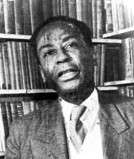 George Padmore was the pseudonym of Malcolm Nurse, who was born in 1902 in Trinidad, then part of the British Empire. After leaving school, Nurse went into journalism before leaving Trinidad to study law at university in the United States. Yet instead of returning home to become a respected professional among the small black middle class of Trinidad, Nurse became a student radical and in 1927 joined the Communist Party of the USA, becoming ‘George Padmore’ in the process. Padmore’s talents as an organiser and writer meant he was soon appointed head of the Communist International’s ‘Negro Bureau’, and from 1929 to 1933 he was a leading agitator for colonial revolution, travelling widely and residing for periods in Moscow, Hamburg, Vienna, London and Paris. As well as editing the Negro Worker, Padmore wrote prolifically, and his The Life and Struggles of Negro Toilers (1931) was particularly influential.
George Padmore was the pseudonym of Malcolm Nurse, who was born in 1902 in Trinidad, then part of the British Empire. After leaving school, Nurse went into journalism before leaving Trinidad to study law at university in the United States. Yet instead of returning home to become a respected professional among the small black middle class of Trinidad, Nurse became a student radical and in 1927 joined the Communist Party of the USA, becoming ‘George Padmore’ in the process. Padmore’s talents as an organiser and writer meant he was soon appointed head of the Communist International’s ‘Negro Bureau’, and from 1929 to 1933 he was a leading agitator for colonial revolution, travelling widely and residing for periods in Moscow, Hamburg, Vienna, London and Paris. As well as editing the Negro Worker, Padmore wrote prolifically, and his The Life and Struggles of Negro Toilers (1931) was particularly influential.
However, when the rise of Hitler’s Nazis in Germany led the Soviet Union to join the League of Nations and seek new diplomatic and military ties with Britain and France, anti-colonialism was no longer the central issue it once was for the Communist International. Resigning from his positions in disgust, the anti-imperialist Padmore survived a vicious Stalinist witch-hunt, and in 1935 returned to Britain. Meeting up again with his boyhood friend from Trinidad, the then Trotskyist C.L.R. James, Padmore from his base in London now steadily evolved into arguably one of the twentieth century’s most important Pan-African figures. Though close to the Independent Labour Party in Britain, and writing prolifically for its publications, Padmore never formally joined, but continued to devote his energies to the struggle to liberate Africa from colonial rule.
In 1937, Padmore formed the International African Service Bureau, later the Pan-African Federation and in 1945 was central to organising the legendary Fifth Pan-African Congress in Manchester. Besides writing several books from his London home, from How Britain Rules Africa (1936) to Pan-Africanism or Communism? (1956), Padmore’s greatest triumph undoubtedly came when one African disciple of his, Kwame Nkrumah, led the Gold Coast from British colonial rule to independence in 1957. Though Padmore’s experience working in Ghana as advisor to Nkrumah in the last years of his life was to be a rather disappointing one, that he lived to witness the birth of a black nation in Africa remains a vindication of, and a testament to, his life’s work.
Paine, Thomas (1737-1809)
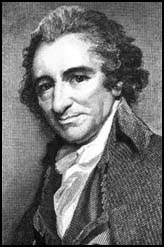 Born in Thetford, England in 1737, of a corseter. Dropped out of school at the age of 12 and began apprenticing for his father. At 19 he went to sea, and by 1768 he found himself as an excise officer. In 1772, he published The Case of the Officers of Excise, arguing for a pay raise for officers. In 1774, he met Benjamin Franklin in London, who helped him emigrate to Philadelphia where he found work as a journalist.
Born in Thetford, England in 1737, of a corseter. Dropped out of school at the age of 12 and began apprenticing for his father. At 19 he went to sea, and by 1768 he found himself as an excise officer. In 1772, he published The Case of the Officers of Excise, arguing for a pay raise for officers. In 1774, he met Benjamin Franklin in London, who helped him emigrate to Philadelphia where he found work as a journalist.
In 1776, he published Common Sense, a defence of American Independence from England and joined the Continental Army. Although not a success as a soldier, he produced The Crisis (1776-83), which helped inspire the Army. This pamphlet was immensely popular and was read by almost everyone in the colony.
He soon returned to Europe however, working on a smokeless candle and an iron bridge. In 1791-92, he wrote The Rights of Man in defence of the French Revolution. As a result Paine was labeled an outlaw in England; to avoid arrest, he fled to France joined the Convention.
By 1793, he was imprisoned in France for not endorsing the execution of Louis XVI. During his imprisonment, he wrote and distributed the first part of The Age of Reason (1794-96). He narrowly escaping execution and was freed in 1794, thanks to the efforts of James Monroe, then U.S. Minister to France. Paine remained in France until 1802 when he returned to America on an invitation from Thomas Jefferson. Because of his radical religious views, Paine had fallen out of favour with the public; abandoned by his friends, he died on June 8, 1809 at the age of 72 in New York City.
See Thomas Paine Archive.
Pakkiriswamy Pillai, S.
A Congressman who supported labor causes and was active with the MLU. Closely associated with MLU President, G. Selvapatty Chettiar, a popular Congressman in Madras and member of the Madras Corporation. Editor of MLU newspaper, Indian Labourer (Tamil edition). After MLU election in 1946, he shifted his allegiance to the Bolshevik Leninist Party of India leader, S.C.C. Anthony Pillai, the new president. Became close sympathizer of the BLPI. Member, MLU Strike Committee, 1947; arrested during the strike. Councillor, Madras Municipal Corporation, 1948-73; elected Deputy Mayor, Madras Corporation. Treasurer and later General Secretary, MLU. After entry into SP, he published Socialist Appeal from the MLU Press on Strahan’s Road, Madras. General Secretary, Madras Port Trust Employees Union, elected 1958. Member, Madras Legislative Assembly, 1951-62 (Perambur Constituency). Contested Purasawalkam Constituency, Madras Legislative Assembly, on Socialist Labour ticket, 1962 (unsuccessful). A loyal and devoted follower of SCC Anthony Pillai to the end. He died sometime before 2001.
Compiled by Charles Wesley Ervin
Pal, Kanai
Member, RCPI, in Santipur (West Bengal). Contested Santipur seat, West Bengal Legislative Assembly, 1951 (runner-up). Joined RWPI. Merger with RCPI, 1962. Member, West Bengal Lesislative Assembly, Santipur Constituency, 1962-67 (representing RCPI) and 1967-69 (representing CPM).
Compiled by Charles Wesley Ervin
Palani Velayutham, G.
Born Salem (Salem District, Tamil Nadu). Worked as a teacher in Salem. Sympathetic to CPI. Moved to Madras, met S.C.C. Anthony Pillai, recruited to Bolshevik Leninist Party of India, and made General Secretary of Spencer Workers Union. Secretary, Madras Bolshevik Leninist Party of India, 1947. Member of the strike committee, Madras Labour Union strike of 1947. Delegate, Special Convention BLPI, 1948. Later returned to Salem for reasons of economic hardship and resumed teaching.
Compiled by Charles Wesley Ervin
Palante, Georges (1862-1925)
 Philosopher and high school philosophy teacher, Palante was described by the French philosopher Michel Onfray as a Nietzchean of the Left. His writings, strongly influenced by both Nietzche and Max Stirner, advocate an uncompromising individualism (and pessimism), yet his early writings appeared in socialist reviews, and his posterity has been assured by anarchists. During his lifetime he wrote regularly for numerous literary and philosophical reviews, most notably for thirteen years as a reviewer for the “Mercure de France.” He committed suicide at his country home, perhaps because he had been diagnosed with an untreatable degenerative disease.
Philosopher and high school philosophy teacher, Palante was described by the French philosopher Michel Onfray as a Nietzchean of the Left. His writings, strongly influenced by both Nietzche and Max Stirner, advocate an uncompromising individualism (and pessimism), yet his early writings appeared in socialist reviews, and his posterity has been assured by anarchists. During his lifetime he wrote regularly for numerous literary and philosophical reviews, most notably for thirteen years as a reviewer for the “Mercure de France.” He committed suicide at his country home, perhaps because he had been diagnosed with an untreatable degenerative disease.
Palm, August (1849-1922)
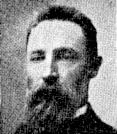 A founder of Swedish Social-Democracy and an early leader of its left wing.
A founder of Swedish Social-Democracy and an early leader of its left wing.
Palm was born the son of a school teacher, near Malmö in the Swedish province of Skåne. An orphan at the age of 10, he trained to become a tailor. At the age of 18 he journeyed through Northern Germany and Denmark where he accepted German Social Democracy. In 1874, he married Johanna Larsson and worked as a tailor in Northern Schleswig. He was deported from Germany in 1877 as a result of his socialist agitation and stayed in Denmark until 1881.
In 1881, he returned to Skåne and organized the Swedish Social Democratic movement. His speech in Malmö on November 6 1881 is regarded as the first socialist speech in the history of Sweden. In 1885, he moved to Stockholm where he led the Social Democratic Association. In 1886, Hjalmar Branting and a group of reformists struggled against Palm for control of the newspaper Social Demokraten. The influx of labor unions previously controlled by liberals complicated the situation. Rather than fight a hopeless battle, Palm left on an agitation trip. In his absence the unions were able to appoint a committee to replace the editor, Axel Danielsson, with Branting.
Palm and Axel Danielsson led the Social Democratic movement in southern Sweden, which was more revolutionary. Palm participated in the Swedish Social Democratic Labor Party's (SAP) founding in 1889. In 1900, he visited America on the invitation of the Socialist Labor Party. In 1907 he founded the newspaper Appell in which he viciously attacked the SAP’s change to support for the Temperance Movement which called for the prohibition of alcohol in Sweden. He also was active with the “Young Socialists,” the party's revolutionary youth branch, which contained anarchist elements.
While playing a lesser role after the 1886 interparty dispute which left Branting in control of the Social Demokraten, Palm remained a revered figure in the SAP, even in Branting’s eyes.
Palm's major writings are “What Do the Socialists Want?” Malmö, 1881, articles in the newspaper Folkviljian, Malmö, 1882, the Party Program, Malmö, 1882, articles in the newspaper Social Demokraten, 1885 and articles in Appell, 1907.
See August Palm Archive.
Pankhurst, Adela
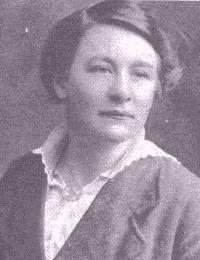 Came to Australia in 1914 and joined the Victorian Socialist Party (VSP); edited its children's magazine; leader of Women's Peace Army during the War, which combined feminism, anti-militarism and socialism, organising some huge anti-war demonstrations; jailed for agitation in support of general strike against the War; Adela' sister, Sylvia Pankhurst had founded the Workers Socialist Federation in Britain in 1919 and supported the October Revolution, and the Workers Socialist Federationwas the first British group to contact the Comintern. Adela was a founding member of the CPA in 1920, but took an ultra-left position; was expelled with the SP, while the WSF merged with the CPGB. Married Seaman's leader Tom Walsh, also a founding member of the CPA. She re-joined the Victorian Socialist Party but became increasingly disillusioned with socialism. In 1941, she formed the Australia First movement, a conservative, nationalist, proto-fascist movement.
Came to Australia in 1914 and joined the Victorian Socialist Party (VSP); edited its children's magazine; leader of Women's Peace Army during the War, which combined feminism, anti-militarism and socialism, organising some huge anti-war demonstrations; jailed for agitation in support of general strike against the War; Adela' sister, Sylvia Pankhurst had founded the Workers Socialist Federation in Britain in 1919 and supported the October Revolution, and the Workers Socialist Federationwas the first British group to contact the Comintern. Adela was a founding member of the CPA in 1920, but took an ultra-left position; was expelled with the SP, while the WSF merged with the CPGB. Married Seaman's leader Tom Walsh, also a founding member of the CPA. She re-joined the Victorian Socialist Party but became increasingly disillusioned with socialism. In 1941, she formed the Australia First movement, a conservative, nationalist, proto-fascist movement.
Pankhurst, E. Sylvia (1882-1960)
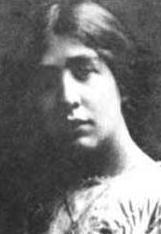 Sylvia Pankhurst, and sister of Adela, above, were born in Manchester, the daughters of Dr. Richard Pankhurst and Emmeline Pankhurst. Both their father, who did political work as an attorney radical lawyer, and mother, were major influences on Sylvia's commitment to socialism.
Sylvia Pankhurst, and sister of Adela, above, were born in Manchester, the daughters of Dr. Richard Pankhurst and Emmeline Pankhurst. Both their father, who did political work as an attorney radical lawyer, and mother, were major influences on Sylvia's commitment to socialism.
Sylvia was a talented artist by training but during her schooling also became involved in the Women's Social and Political Union (WSPU), founded by her mother in 1903, and in which her sister, Christabel, was also very active. In 1906 she served her first prison sentence for her political activities--in her life she would endure several brutal prison sentences involving hunger strikes and forced feedings. She also did work for the Labour Party and became and was closely associated with Kier Hardie, the leader of the party in the House of Commons. In 1911 her book The History of the Women's Suffrage Movement was published. Her writings include 22 books and pamphlets, and numerous articles including the launching of four newspapers.
Sylvia disagreed with the WSPU (popularly known as the Suffragettes) when they turned from a socialist programme. She was expelled by them in 1914, by which time they had abandoned the cause of suffrage as well. As a pacifist, she also disagreed with their complete support of WWI. She turned to the Labour Party to do party work and started the weekly paper, The Women's Dreadnought, (later The Worker's Deadnought) geared for working-class women. The paper was strongly against the war, and during this time she joined Charlotte Despard to form the Women's Peace Army. As a suffragist, Sylvia founded and built the East London Federation of Suffragettes, which campaigned for the vote and for feminist social change in the 1912-1920.
Sylvia attended the Second Congress of the Communist International in August 1921, where she identified herself as part of the Left. In the 1930s, As an anti-racist and anti-fascist, she supported the republicans in Spain, helped Jewish refugees who fled from Nazi Germany and campaigned against the fascist Italian occupation of Ethiopia. She was involved for more than 3 decades in agitation issues, which included the cause of Ethiopia, where she would live that last four years of her life.
A small selection of her writings is in the Sylvia Pankhurst Archive. See also Lenin's letter to Sylvia Pankhurst, 1919.
Pannekoek, Anton (1873 - 1960)
 Dutch Socialist and astronomer. Formed a Marxist party in the Netherlands. He was active in the German Social Democratic party while living in Germany 1906-14. Contributed to Die Neue Zeit. As a theorist, was interested in science and Marxism.
Dutch Socialist and astronomer. Formed a Marxist party in the Netherlands. He was active in the German Social Democratic party while living in Germany 1906-14. Contributed to Die Neue Zeit. As a theorist, was interested in science and Marxism.
See the Pannekoek Archive.
Pareto, Vilfredo (1848-1923)
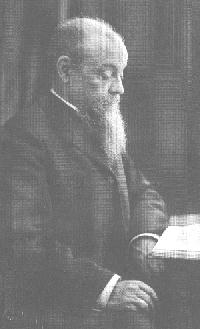 Italian economist and sociologist, known for his theory on mass and elite interaction and his application of mathematics to economic analysis.
Italian economist and sociologist, known for his theory on mass and elite interaction and his application of mathematics to economic analysis.
After his graduation from the University of Turin (1869), where he had studied mathematics and physics, Pareto became an engineer and later a director of an Italian railway and was also employed by a large ironworks. Residing in Florence, he studied philosophy and politics and wrote many articles analysing economic problems with mathematical tools. In 1893 he was appointed to the chair of political economy at the University of Lausanne, Switzerland.
Pareto's first work, Cours d'Économie Politique (1896-97), included his famous but much-criticised law of income distribution, a complicated mathematical formulation in which Pareto attempted to prove that the distribution of incomes and wealth in society exhibits a consistent pattern throughout history, in all parts of the world and in all societies.
In his Manuale d'economia politica (1906), he further developed his theory of pure economics and his analysis of ophelimity (power to give satisfaction). He laid the foundation of modern welfare economics with his concept of the so-called Pareto optimum, stating that the optimum allocation of the resources of a society is not attained so long as it is possible to make at least one individual better off in his own estimation while keeping others as well off as before in their own estimation. He also introduced "curves of indifference," that did not become popular until the 1930s.
Believing that there were problems that economics could not solve, Pareto turned to sociology, writing what he considered his greatest work, Mind and Society (1916), in which he inquired into the nature and bases of individual and social action. Persons of superior ability, he argued, seek to confirm and aggrandise their social position. Thus social classes are formed. In an effort to rise into the elite of the upper strata, privileged members of the lower-class groups continually strive to use their abilities and thus improve them; the opposite tendency obtains among the elite. As a result, the best-equipped persons from the lower class rise to challenge the position of the upper-class elite. There thus occurs a "circulation of elites." Because of his theory of the superiority of the elite, Pareto sometimes has been associated with fascism.
Parija, Murlidhar
Party pseudonym: V. Markandu (?).
Joined Purdy group in Bombay before WWII. Founding member, Mazdoor Trotskyist Party, 1942. Arrested for dacoity during WWII. President, Bombay Committee of MTP, 1948. Trade unionist, Ravi Uday Litho Workers Union, Bombay State Electrical Employees Union, Engineering Workers Union, Bombay and Suburban Reshim Kamgar Union (silk workers), and Bombay Textile Labour Union. Founding member and Joint Secretary, Bombay State Committee, United Trades Union Congress. Co-editor, Socialist, 1948. Editor, The Militant, 1959-60; Marxist Outlook, 1966-70. General Secretary, Revolutionary Workers Party, 1958-60. General Secretary, Socialist Workers Party, 1965-69. Activist, Pragatshil Yuvak Mandal, Ahmedabad, 1959-60.
Compiled by Charles Wesley Ervin
Parsons, Albert (1848-1887)
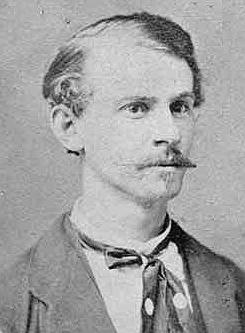 One of the Haymarket martyrs. Parsons was born in Alabama and then moved to live with his brother in Texas when he was very young after his parents died. He was mainly raised by a former slave housekeeper of whom he was very fond. This experience helped him later become very active in agitation for Black political rights in the South. At the beginning of the Civil War, he served as a confederate soldier in the cavalry. In the early 1870s he married Lucy, a woman of Native and African American descent. They moved to Chicago in 1873 partly to be removed from the threatening presence of the Ku Klux Klan.
One of the Haymarket martyrs. Parsons was born in Alabama and then moved to live with his brother in Texas when he was very young after his parents died. He was mainly raised by a former slave housekeeper of whom he was very fond. This experience helped him later become very active in agitation for Black political rights in the South. At the beginning of the Civil War, he served as a confederate soldier in the cavalry. In the early 1870s he married Lucy, a woman of Native and African American descent. They moved to Chicago in 1873 partly to be removed from the threatening presence of the Ku Klux Klan.
Following in the wake economic depression, the summer of 1877 had one of the largest mass strikes in US history. Rail workers all over the country joined the picket line to protest wage and demand better working conditions. The center of activity moved to Chicago, where rail workers waged a militant and sometimes violent battle with the bosses and police. During the strike Albert would address large crowds which brought him to the forefront of the labor movement, first involved as a socialist and Master Workmen of the Chicago branch of the Knights of Labor.
He and Lucy would reject the socialist approach to the political situation and become anarchists, both active members of Chicago's Social Revolutionary club. Parsons was one of the speakers at the Haymarket rally but was not present during the explosion. He avoided arrest, but appeared in the courtroom on the first day of trial testimony to join his comrades. He was found guilty and executed in 1887.
Further Reading:
Parson's speech in court
Subject: May Day.
Parsons, Lucy (ca. 1853-1942)
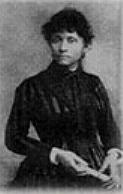 Little is known about her early life, but it is thought that Parsons was the daughter of slaves from Texas. In the early 1870s she married Albert Parsons, who would become one of the Haymarket martyrs.
Little is known about her early life, but it is thought that Parsons was the daughter of slaves from Texas. In the early 1870s she married Albert Parsons, who would become one of the Haymarket martyrs.
Because of Albert's radical politics, he would have difficulty holding steady employment, so Lucy opened a dress shop to support their two children. She was also very politically active, hosting meetings for the International Ladies' Garment Workers Union (ILGWU) and writing for radical publications such as The Socialist and The Alarm. In her writing she would advocate "propaganda by the deed," which maintained that only violent direct action or the threat of such action will ultimately win the demands of the workers. She and Albert would help found the International Working People's Association (IWPA) in 1883.
During the Haymarket Affair, Lucy became a popular speaker as she toured the country on a campaign for clemency, often fighting police trying to restrict her access to speaking forums. After her husband's execution Lucy would remain involved in revolutionary politics, eventually splitting with the anarchist movement and joining the I.W.W. in 1905. In the 1920's Lucy would begin working with the Communist Party, joining officially in 1939, and was involved on behalf of workers, political prisoners, people of color, and women, including the Scottsboro, Angelo Hearndon and Tom Mooney cases. Lucy would continue to fight against oppression until an accidental fire killed her and her lover in 1942.
Further Reading: Subject: May Day.
Parsons, Talcott (1902-1979)
 American sociologist, founder of the functionalist school in sociology, whose work was concerned with a general theoretical system for the analysis of society, the central idea of which is the vision of society as an organism (rather than the rigid structure of Structuralism), in which each of the various parts of the social body have a role in maintaining a dynamic equilibrium.
American sociologist, founder of the functionalist school in sociology, whose work was concerned with a general theoretical system for the analysis of society, the central idea of which is the vision of society as an organism (rather than the rigid structure of Structuralism), in which each of the various parts of the social body have a role in maintaining a dynamic equilibrium.
Parsons studied at Amherst College, Mass., London School of Economics and the University of Heidelberg, where he received his PhD, in 1927, returning to the US to teach economics, eventually becoming Professor of Sociology at Harvard in 1944, where he worked until his retirement in 1973.
In line with the then dominant view of economics as expressing the perception and psychological reactions of the economic agents to each other's actions, Parsons sought to merge economic science with psychology. His first major work, The Structure of Social Action, published in 1937, is a comprehensive review of what he called “positivistic sociology” in which he presents criticisms of Alfred Marshall, Vilfredo Pareto, Émile Durkheim, and Max Weber.
In his 1951 The Social System, he turned his attention to the analysis of large-scale systems and the problems of the social order, integration, and equilibrium and advocated his method of structural-functional analysis, a study of the ways in which the interrelated and interacting units that form the structures of a social system contribute to the development and maintenance of that system in a condition of dynamic equilibrium. In this approach, the researcher asks themself: what is the function of each of the institutions to be seen in a given social order, on the understanding that each contributes in some particular way to the maintenance of the stability of the system.
Further Reading: The Structure of Social Action.
Parvus, Alexander Helphand (1869 - 1924)
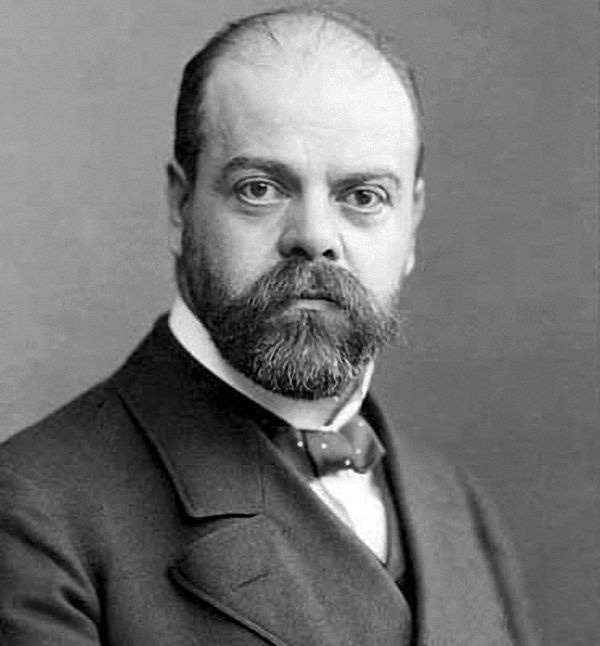 Prominent Marxist theoretician in Eastern Europe; reached conclusions similar to Trotsky's theory of permanent revolution. Trotsky broke with him in 1914 when Parvus became a leader in a pro-war (WWI) sect of the German Social Democracy. In 1917 he failed to reconcile the German party with the Bolsheviks and later the Independent Socialists with the Ebert-Noske leadership.
Prominent Marxist theoretician in Eastern Europe; reached conclusions similar to Trotsky's theory of permanent revolution. Trotsky broke with him in 1914 when Parvus became a leader in a pro-war (WWI) sect of the German Social Democracy. In 1917 he failed to reconcile the German party with the Bolsheviks and later the Independent Socialists with the Ebert-Noske leadership.
See Parvus Archive
Pascal, Blaise (1623-1662)
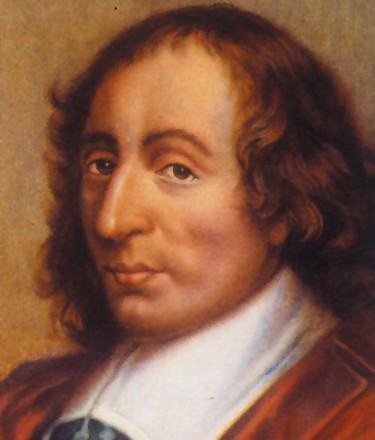 French mathematician, physicist, philosopher, and Christian religious thinker. Best known for his work on religious belief and mathematics, but also developed one of the first radical critiques of the Ancien R�gime in France, and of the idea of a natural right to property.
French mathematician, physicist, philosopher, and Christian religious thinker. Best known for his work on religious belief and mathematics, but also developed one of the first radical critiques of the Ancien R�gime in France, and of the idea of a natural right to property.
During his relatively brief life, Pascal published works on geometry, the physics of air pressure and vacuums (hydrostatics), and invented a mechanical calculator (the “pascaline”). Following an intense, quasi-mystical experience in 1654, he became increasingly committed to the Jansenist theological movement centered at Port-Royal convent. With his caustic Provincial Letters (1656-57), published under a pseudonym, he intervened on behalf of the Jansenists in the political and theological controversy with the Jesuits at the time.
Most of Pascal’s work, however, including his magnum opus, the Pens�es (“thoughts”), was not published until after his death. The Pens�es is a collection of notes, ostensibly for an Apology for the Christian Religion, but which contain reflections on a wide variety of subjects, including the nature and limits of reason and knowledge, the sources of belief and human motivation, the meaning of the human condition, and the role and relationship of justice and force in society.
At the heart of Pascal’s social thought is the idea that often what is taken as natural is actually the result of custom and social conditioning. So, in the Pens�es, Pascal tries to show that there is a dialectic between true justice, which is always in dispute, and force, which is indisputable. Being unable to “fortify justice,” we have “justified force” to ensure peace. It is by the effect of imagination and habituation – of human psychology in certain social conditions and relations – that ideas legitimating the position of the powerful are (mis)taken for natural justice, thus stabilizing society.
Similarly, the Three Discourses on the Condition of the Great (posthumous), demystifies the ideological foundations of feudalism by positing, before the Enlightenment and Rousseau, that all people are naturally equal; the difference between a king and a commoner is one of human establishment, not of any natural quality. Hence, not only do absolute monarchy and noble privilege – the pillars of the Ancien R�gime – have an imaginary foundation, so, too, do property rights. Those who possess great riches and occupy a superior social position do so by a combination of institutionalized force, historical chance, and a kind of popular misunderstanding – not by necessity, merit or natural right.
Despite this radical critique, Pascal advises against revolution to achieve a more just social order. Pascal’s reasoning here presents a key puzzle of his thought. In his view of history, the dialectic between force and justice allows for no synthesis or progress, only cyclical conflict. We do not have a clear enough view of true justice to establish it beyond dispute, so we should prefer peace and order, which we can establish. Pascal’s experience with la Fronde, a series of ill-fated noble uprisings against royal power between 1648 and 1653, may also have contributed to this reticence.
Instead, Pascal counseled a kind of lucid submission to the existing social order, and its internal standard of justice. Although consistent with a certain tradition of Christian political conservatism, Pascal’s position is more complex. If one is to render outwardly onto established sovereigns (e.g., kings in monarchies, the majority in democracies) the respect that is fitting to that position, one is to refrain from seeing any natural superiority (or inferiority) in those of a different rank. Furthermore, one is to recognize that there are higher “orders,” like those governing what merits esteem or belief, which it would be tyrannical to subordinate to the political order.
This hybrid approach – radical critique with conservative prescription – offers a point of contrast with the revolutionary tradition. But it also reflects the debate surrounding Marx’s own equivocal treatment of justice as, on one hand, the means by which modes of production judge themselves, but also, potentially, a criterion that could allow for their comparative evaluation (e.g., of why socialism or communism would be preferable to capitalism).
Also of interest in the Pens�es, is the famous “wager” argument for believing in God. Rather than trying to prove the existence of God, like his contemporary Descartes, Pascal argues for the rationality or advantage of religious belief. This distinction can be seen to presage Marx’s analysis of religion’s social function. Also like Descartes, Pascal is a dualist, in that he separates mind and body, but, unlike Descartes, he emphasizes the inexorable role of the body in the formation of beliefs, embedded in social contexts, through habit and custom.
Pascal’s contemporary legacy is visible in diverse fields. The “wager” has been the subject of much work in decision theory. In the philosophy of science, Pierre Duhem, one of the founders of epistemological holism (the thesis that theories cannot be tested in isolation because they depend on other theories) draws especially from Pascal’s analysis of reasoning in Of the Geometrical Mind [_esprit_] (1658, but published posthumously). And, in social theory, the critical sociologist Pierre Bourdieu invokes Pascal’s account of incorporated habits and symbolic power in the shaping of collective beliefs (see his M�ditations Pascaliennes, 1997).
Pashukanis, Yevgeniy Bronislavovich (1891 - 1937)
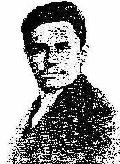 Marxist legal philosopher of international stature, Pashukanis explained that the task of Socialist society is the dismantling of the rule of law.
Marxist legal philosopher of international stature, Pashukanis explained that the task of Socialist society is the dismantling of the rule of law.
Born February 10, 1891, in Lithuania, Pashukanis studied law at Petersburg University, where he was expelled due to his revolutionary activities and beliefs. He continued his education abroad at the University of Munich, studying both law and political economy. In 1912 Pashukanis joined the Bolshevik party. In 1918 he served as a people's judge around Moscow, then worked as a legal adviser in the People's Commissariat for Foreign Affairs of the Russia Republic, and soon became a vice-commissar of Justice.
Pashukanis's tour de force is his 1924 work General Theory of Law and Marxism, which brought him immediate international fame. The book was soon published in three editions and three languages (Russian, German, and Italian). Pashukanis was on the editorial boards of the major encyclopedias (Encyclopedia of State and Law) and law periodicals of the nation until 1930. He taught law and shaped the syllabi and text books of law teaching at Moscow University and the Institute of Red Professors of the Communist Academy. Pashukanis soon became the Director of the national Institute of State, Law, and Soviet Construction (it would be renamed several times).
Pashukanis's General Theory of Law and Marxism was banned in the Soviet Union during the Stalinist uprising of the 1930s, and would not be again published in the USSR until 1982 (though he was "rehabilitated" in 1956 by the RSFSR Supreme Court). In response to the Stalin supported Vyshinsky, who made "critiques" of Pashukanis' work, he was forced to publicly "revise his thinking", in 1930, 1934, and 1936. He refused however, to accept the baseless Stalinist refutations of his philosophy. In January of 1937 he was arrested, tried, and shot dead.
Pashukanis's theory stands as one of fundamental importance to understanding law, in both content and form. He explains that law (where it regulates human conduct) is created when alienation and the opposition of classes begins. He binds this closely with the emergence of the commodity form in mediating material exchanges, as humans become bearers of rights (as opposed to customary privileges) as a result of being producers in a certain class. But where Marx and Engels explained the content of law resting within political economy, Pashukanis fills out Marxist theory by exploring the forms of law. Pashukanis argues that the rule of capitalist law will largely carry itself over into Socialism, that there is no such thing as workers' law, only the dismantling of capitalist law, as society moves from capitalism to socialism, and from socialism into communism.
Naturally, it was on this basis that Pashukanis was attacked by the Stalinists, who believed in increasing the power of the state and thus the rule of law, and in building up a gigantic bureaucracy around a myriad of rules and regulations. The Stalinists attempted to argue that law is an instrument of class rule, and that workers' should use it just as any other class has in the past -- completely misunderstanding that the essence of workers' rule is the destruction of the state, and thus, that by enforcing and building up the power of the state, the rule of workers' is crushed. Pashukanis emphasised that the rule of law is not neutral, that law is tied to political economy, and that just as exploitation cannot be class neutral, nor can law -- both institutions must be abolished during the Socialist transformation.
Patchamuthu, Appavoopillai (1921-present)
Party pseudonym: Ganesh
Born Koslanda (Badulla District), Ceylon, son of R. Appavoopilai, a prosperous landowner and owner of a printing business. Educated Uva College, Badulla. Participated in student and trade union activities while in school. Also worked at his family's printing business. Attended Lanka Sama Samaja Party mass rally in May 1940, to protest police atrocities against strikers at Wewessa Estate. Joined Lanka Sama Samaja Party in 1941 and worked with the underground party in Colombo. Attended the first conference of the Bolshevik Leninist Party of India in Madras in September, 1944 as a delegate from Ceylon. Led labor actions during the 1945 general strike in Colombo. Organized plantation labor in Badulla and Haputale Districts, 1945-46; along with J.C.T. Kotelewala led a strike of more than 20,000 plantation laborers in April 1946. Ran for parliament from Haputale Constituency, 1947 (lost). After the elections, went to Madurai to help Bolshevik Leninist Party of India trade unionists, 1947-48. Returned to Ceylon, setlled in Koslanda. Elected to the village council, 1951-56. Withdrew from active party work in 1955 and ran a commercial printing press. Opposed the LSSP decision to seek coalition government with SLFP, 1964, but remained in the party. Elected to Central Committee, LSSP, in the 'seventies. Resigned from LSSP, 2000. Resides in Colombo.
Compiled by Charles Wesley Ervin
Paul, William (1884-1958)
Willie, or as he was more widely known later in life, Bill, Paul was born in 1884. He joined the Glasgow Socialist Labour Party (SLP) early on and was to become its leading Marxist theorist and tutor and later a founding member of the Communist Party and one of its key figures in the 1920s.
He was based in Derby from around 1910 or 1911 and earned a living by running a small hosiery and drapery market stall as a one-man business. This gave the necessary independence required to become a semi-professional revolutionary and was so lucrative that other stalls were opened in Manchester, Birmingham, Sheffield, Rotherham and Chesterfield. These were surreptitiously used as centres for radical literature distribution and revolutionary fund-raising. Whilst this business and the role of wandering Marxist tutor brought Paul to temporary stays in many northern and midland’s towns and cities, he was mainly resident in Derby for the rest of his life, where he was married and had one daughter in the late 1920s.
During the 1914-18 war years, at least, in common with Arthur MacManus, Paul was a close personal friend of the Derby anti-war activist, Alice Wheeldon, and her family. (MacManus regularly came to Derby in connection with the shop stewards’ movement and was a welcome visitor to the Wheeldon’s; he eventually married the second daughter Hettie.) Alice Wheeldon, who may have been involved in assisting army deserters to escape via Ireland to the USA, was imprisoned after an agent provocateur testified that she had planned a plot to poison the Prime Minister, Lloyd George! However, it seems more likely that she had sought to obtain poison to dispose of guard dogs to aid conscript escapes from army prisons.
Paul was joint editor, with Tom Bell, of the SLP’s journal, The Socialist, and enjoyed a strong reputation as a formidable Marxist lecturer and theoretician. His SLP social science classes in Derby from 1917-18 were especially well attended and have been compared by the son of a contemporary ‘student’ as having the same degree of repute as the similar approach of the Clydeside, John MacLean, in that highly complicated questions were well understood by gigantic audiences of working class people.
A book of his lectures entitled The State: its origin and functions was published as a result of these classes. The work clearly follows classic Marxist themes, but more interestingly draws the same or similar theoretical conclusions as Lenin was reaching at the same time, without the benefit of Paul being able to read Lenin’s work at this point, since it had not yet been translated.
Paul was also involved in Derby’s Clarion Club and in Manchester played a role in the Labour Party. No doubt his base in Manchester facilitated his contesting the 1918 election in Ince for the SLP, where he took 13% of the vote in a straight fight with an official Labour candidate.
At the time of the foundation of the Communist Party, Willie Paul lived at ‘Pen Bryn’ in what was then the village of Littleover, just on the outskirts of Derby. he was the key figure in the Derby Communist Unity group, which united local SLPers and Derby’s branch of the British Socialist Party. He was made a member of the Communist Party’s Provisional Executive Committee, having been particularly involved in the debates inside the SLP over the unity process and the nature of the new party. He was a major influence in coalescing those in the SLP who favoured joining the CPGB.
At the founding conference however, Paul displayed much of the revolutionary zeal, which the SLP had made its hallmark, by speaking against affiliation to the Labour Party in a most scathing and cynical way. This was of course entirely consistent with the SLP’s view of the matter. Nevertheless, the anti-affiliationists were beaten in the debate and the Communist Party’s policy was to be for affiliation.
Paul’s Derby Communist Unity Group was one of many smaller, local societies represented at the founding Unity Convention. The national Communist Unity Group was the faction inside the SLP, which had convened a special national conference at Nottingham to win the SLP to the notion of unity of all communist organisations. The majority of the SLP official leadership expelled the CUG activists for this action but most members followed Paul and his (subsequently more famous) Glasgow comrades into the new Party. Whilst the SLP rump carried on as a shell organisation it was a mirage for decades to come and eventually faded away.
Paul played an important role nationally for some time to come in the young Communist Party. He was editor of the Communist Review, the CPGB theoretical journal from 1921-3. He stood again for Parliament, unsuccessfully, contesting the Manchester Rusholme constituency as a Labour-Communist candidate in the general elections of 1922 and 1924. It should be noted that he was bravely following Communist Party policy, even though he disagreed with it.
Paul was, thus, well known in Manchester, having had strong local connections there for at least ten years. He had often “rendered songs of the Irish potato famine” at the Openshaw BSP meetings for Harry Pollitt, later to become the long-standing leader of British Communism. Paul has been described by Pollitt’s ‘official’ biographer as a “powerful and expressive baritone”.
He polled a respectable 21% of the vote against strongly fielded Tory and Liberal opponents in the 1922 election. In the following election, he achieved much the same result, but increased the share of the vote, this time as an official Communist with Labour backing.
He then became the editor of the Communist Party inspired broad left journal, the Sunday Worker, for the short period of its existence in the late 1920s. This reached a circulation of 100,000 and was unarguably a great success for the Party, so much so that it encouraged the drive to achieve a daily paper, the Daily Worker.
Leaving the national stage during the period of the ‘Bolshevisation’ of the CPGB, mainly possibly to marry and bring up a daughter, Paul nonetheless remained on the fringes of Communist politics all his days. In the 1930s and l940s he was closely identified with Soviet friendship activities in Derby. During the second world war, he was much involved in campaigning work in aid of the Soviet allies in Derby and and was a prominent supporter of the Derby Peace Council in the l950s.
He was widely regarded as a man of substance in the local labour Derbyshire movement, even though he was not particularly active in his later years, some have suggested due to family reasons. A veteran Communist Party member in Derby once implied that first his wife and then his daughter were violently opposed to his politics, the latter being embarrassed by the fame that his name still possessed decades after his death. Sadly, all his papers and documents were disposed of by the family when he died in 1958 in Derby but he had foresight to leave his considerable personal library to the Party in his will.
From Graham Stevenson.
Further Reading: William Paul Archive.
Pavlov, Ivan (1849-1936)
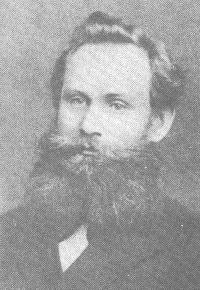 The founder of behaviourism, Russian physiologist known for the concept of conditioned reflex. In a now-classic experiment, he trained a dog by ringing a bell before mealtime, and through the course of time showed that simply by ringing the bell the dog would salivate. He developed a similar conceptual approach in his studies of human behaviour. Pavlov’s work, taken together with that of Freud, marks the beginning of modern psychology, providing the first real elements of a materialist framework for the study of the psyche.
The founder of behaviourism, Russian physiologist known for the concept of conditioned reflex. In a now-classic experiment, he trained a dog by ringing a bell before mealtime, and through the course of time showed that simply by ringing the bell the dog would salivate. He developed a similar conceptual approach in his studies of human behaviour. Pavlov’s work, taken together with that of Freud, marks the beginning of modern psychology, providing the first real elements of a materialist framework for the study of the psyche.
The son of a priest, Pavlov left the seminary to enter the University of St. Petersburg, where he studied chemistry and physiology, later travelling to Germany to study under Carl Ludwig and Rudolf Heidenhain. Returning to St Petersburg in 1888, he began research on the mechanisms regulating blood pressure. His skill as a surgeon allowed him to carry out measurements on dogs without anesthesia and trace the train of nervous stimuli involved in the system regulating blood pressure.
In 1890, he became professor of physiology at the newly founded Institute of Experimental Medicine, where he remained until 1924. For most of his life from this time forward his work focussed on the action of the digestive glands of animals, in the course of which he formulated his famous laws of the conditioned reflex. (See Vygotsky's assessment of the significance of Pavlov's methodology in his Two Psychologies). Pavlov's aim was to establish on the basis of this one body-process, the correlation between objective, measurable physiological phenomena and the higher nervous activity associated with it.
Pavlov's relationship with the Bolsheviks after the Revolution is of considerable interest. On the one hand, Pavlov was soneone totally focussed on his science, but with a passionate commitment to pursuit of truth and a concern for precision and professionalism in his work which bordered on the obsessive; on the other hand, the Bolsheviks valued the rich inheritance of science from the old order, where science was the only way open to an ordinary citizen into high society, a practice which had created a scientific community superior to many in Western Europe. Conditions in Petrograd were desperate beyond belief by 1921-2, and Pavlov requested permission from Lenin to transfer his laboratory abroad. Lenin denied the request, and Pavlov refued personal privileges offered to him while his staff worked in near-starvation conditions. After returning from a visit to the US in 1923, he publicly denounced the Revolution, saying “For the kind of social experiment that you are making, I would not sacrifice a frog's hind legs!” After Stalin came to power in 1924, he resigned his post saying, “I also am the son of a priest, and if you expel the others I will go too!” See his Lecture on the Cerebral Hemisphere, from this period.
In 1927, he wrote to Stalin, protesting “On account of what you are doing to the Russian intelligentsia – demoralizing, annihilating, depraving them – I am ashamed to be called a Russian!" In the late 1920s, he refused Nikolay Bukharin admission to his laboratory. Later on, like many others, with Russia under attack by Hitler, Pavlov moderated his criticism and got on with his scientific work as best he could.
Beginning about 1930, Pavlov tried to apply his concept of conditional reflex to human psychoses, which he saw as a mechanism to shut out the external world, in much the same way that the body protects a wound by stiffening the muscles with an influx of blood. The idea was applied in the treatment of psychiatric patients in Russia, placing patients nonstimulating surroundings to moderate the stimulus for psychosis. Pavlov also developed a conditional reflex theory of language.
Pavlović, Živojin (1898-1941)
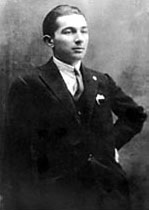 Pavlović was a Yugoslav Communist, author of the “Balance-sheet of the Soviet Thermidor,” one of the first books on Stalin’s purges in the world. One of the leading CP Yugoslavia’s cadres in the 1930s, Pavlović was very close with the secretary of the party Josip Čižinski (alias Milan Gorkić). When Gorkić was executed as a spy by the Stalin’s regime in 1937, Pavlović became disillusioned with the USSR, and in 1939, after the signing of the treaty with Nazi Germany, he totally broke with the Communist movement. He returned from Paris in Yugoslavia, and next year he has published the “Balance-sheet of the Soviet Thermidor.” The book was instantly confiscated by the police because then the bourgeois Yugoslav government was trying to establish diplomatic relations with USSR. After the Axis occupation of Yugoslavia, the Josip Broz Tito’s partisans, that started rebellion against the foreign occupation, have captured Pavlović and, after torturing him, have killed him for his old sins.
Pavlović was a Yugoslav Communist, author of the “Balance-sheet of the Soviet Thermidor,” one of the first books on Stalin’s purges in the world. One of the leading CP Yugoslavia’s cadres in the 1930s, Pavlović was very close with the secretary of the party Josip Čižinski (alias Milan Gorkić). When Gorkić was executed as a spy by the Stalin’s regime in 1937, Pavlović became disillusioned with the USSR, and in 1939, after the signing of the treaty with Nazi Germany, he totally broke with the Communist movement. He returned from Paris in Yugoslavia, and next year he has published the “Balance-sheet of the Soviet Thermidor.” The book was instantly confiscated by the police because then the bourgeois Yugoslav government was trying to establish diplomatic relations with USSR. After the Axis occupation of Yugoslavia, the Josip Broz Tito’s partisans, that started rebellion against the foreign occupation, have captured Pavlović and, after torturing him, have killed him for his old sins.
In 1948 Yugoslav Communists themselves came into conflict with Stalin, but neither Pavlović wasn’t rehabilitated, nor was his book republished, or even mentioned as a reference in books dealing with Stalin and USSR. Only in 1989 was his book republished.